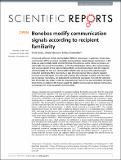Bonobos modify communication signals according to recipient familiarity
Abstract
Human and nonhuman primate communication differs in various ways. In particular, humans base communicative efforts on mutual knowledge and conventions shared between interlocutors. In this study, we experimentally tested whether bonobos (Pan paniscus), a close relative to humans, are able to take into account the familiarity, i.e. the shared interaction history, when communicating with a human partner. In five experimental conditions we found that subjects took the recipients' attentional state and their own communicative effectiveness into account by adjusting signal production accordingly. More importantly, in case of communicative failure, subjects repeated previously successful signals more often with a familiar than unfamiliar recipient, with whom they had no previous interactions, and elaborated by switching to new signals more with the unfamiliar than the familiar one, similar to what has previously been found in two year-old children. We discuss these findings in relation to the human capacity to establish common ground between interlocutors, a crucial aspect of human cooperative communication.
Citation
Genty , E , Neumann , C & Zuberbuehler , K 2015 , ' Bonobos modify communication signals according to recipient familiarity ' , Scientific Reports , vol. 5 , 16442 , pp. 1-10 . https://doi.org/10.1038/srep16442
Publication
Scientific Reports
Status
Peer reviewed
ISSN
2045-2322Type
Journal article
Description
This project has received funding from the European Union’s Seventh Framework Programme for research, technological development and demonstration under grant agreement no 283871.Collections
Items in the St Andrews Research Repository are protected by copyright, with all rights reserved, unless otherwise indicated.

